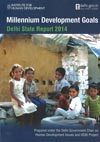 Millennium Development Goals : Delhi State Report 2014
Published: 2014
Publisher: Institute for Human Development under the Delhi Government Chair on Human Development Issues and HDBI Project
ISBN: 978-81-88315-43-7
|
Millennium Development Goals (MDGs) are an outcome of the UN Millennium Declaration of September 2000 in which 189 nations of the world committed to provide the right to development to the world’s population, with a human rights approach by 2015. The concept of MDGs is a comprehensive approach and offers a coordinated strategy which aims to tackle many problems simultaneously. Throughout the globe, the MDGs are being monitored systematically and the progresses made are evaluated periodically to achieve the goals and targets.
Government of India has recently brought out the Millennium Development Goals – India Country Report 2014. Prior to this, MDG – India Country Report was published in 2012. These reports are prepared by the Social Statistics Division (SSD) of the Ministry of Statistics and Programme Implementation (MOSPI), Government of India. In the 59th meeting of the National Statistical Commission (NSC), held on19 and 20 August, 2013, the Commission felt that the State level MDG reports should not be developed by the MOSPI and that they should be developed by the states as per the Social Statistics Division (SSD) framework. NSC took up the matter with the Planning Commission suggesting it to advise states to prepare state MDG Reports as it is done in the case of Human Development Report for states and districts. The Planning Commission subsequently requested the states to commence the work relating to the state level MDG reports in the framework provided by MOSPI.
|
 Beyond Averages: Child Well- Being through an Equity Analysis
By Preet Rustagi, Soumya Kapoor Mehta, Sunil Kumar Mioshra, Balwant S. Mehta and Ramya Subrahmanian.
Published: October 2012
Publisher: UNICEF and Institute for Human Development
ISBN: 978-81-88315-28-4, 2012 /p-VI+52 /Paperback
|
The report draws on a framework developed by UNICEF for a global analysis on child poverty, which endorses the UN General Assembly?s recognition of ?child poverty as an area of concern?. The objective is to look at conventional poverty and demographic data through the lens of child well-being and also to explore achievements in the numerous interlinked dimensions of basic rights for children across vectors of wealth, gender, location and social group. By basic rights are meant a certain core minimum set of material and non-material needs that are required for a child to grow into a healthy adult and avail opportunities available to him or her in the society. The report attempts to bring an equity lens through which to review India?s progress on social development by disaggregating the indicators from the perspective of children?s well-being.
|